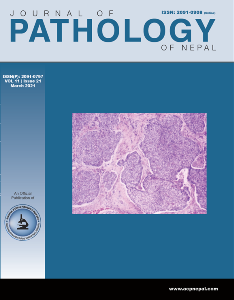Isocitrate dehydrogenase 1and 2 gene mutation status– a critical parameter in the diagnosis and prognosis of adult gliomas
DOI:
https://doi.org/10.3126/jpn.v11i1.28992Keywords:
Adult glioma; IDH1/2 mutated gliomas; Immunohistochemistry; Isocitratedehydrogenase 1 and 2 genesAbstract
Isocitrate dehydrogenase 1 and 2 mutations are known to be early events in gliomagenesis and have a definite role in tumor progression.Isocitrate dehydrogenase1/2 mutation status is considered to be one of the most powerful independent positive predictor of outcome amongst all molecular markers described in association with gliomas. The inclusion of this parameter in the 2016 update of the World Health Organization Classification of Tumors of The Central Nervous System reinforced its importance in glioma classification and prognostication. As a result, now there is enough evidence to prove that Isocitrate dehydrogenase-mutant and Isocitrate dehydrogenase- wildtypegliomas are two biologically distinct categories of gliomas with likely different pathways of tumorigenesis, different clinical outcomes, and respond differently to similar treatment strategies. Increasing knowledge aboutthe role of IDH1/2 mutation in gliomagenesis has resulted in many novel targeting strategies being developed and evaluated forusefulness in the clinical setting. This literature review aims to highlight the diagnostic and prognostic importance of Isocitrate dehydrogenase1/2 gene mutations in adult gliomas.
Downloads
Downloads
Published
How to Cite
Issue
Section
License
This license enables reusers to distribute, remix, adapt, and build upon the material in any medium or format, so long as attribution is given to the creator. The license allows for commercial use.




